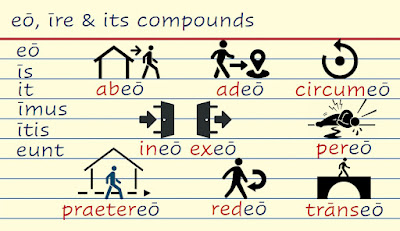https://adckl.blogspot.com/2024/04/160324-eo-ire-irregular-go-compounds-of.html
https://www.facebook.com/groups/latinforstarters/posts/407788755165732/
eō, īre (go) is classified as an irregular verb in that it
does not conform precisely to the way in which other verbs are formed. Despite
this, it still has the same personal endings. What is unusual about the verb is
that almost all those endings are attached to a single vowel
e¦ō: I go
ī¦s: you (sg.) go
i¦t: he / she / it goes
ī¦mus: we go
ī¦tis: you (pl.) go
eu¦nt: they go
compound verbs
a compound verb is one that is made of two or more parts
e.g. over¦eat, black¦mail, under¦estimate etc. In Latin, compound verbs are
often created with prefixes, many of which also function as prepositions. Here
are a few examples although other compounds with eō exist.
ā / ab [(away) from] > ab¦eō,
abīre: go away; depart
ad [towards] > ad¦eō, adīre: go
to; approach
circum [around] > circum¦eō,
circumīre: go around; surround
ē / ex [out of] > ex¦eō, exīre:
go out
in [in(to) > on] in¦eō, inīre: go
into
trāns [across] > trāns¦eō,
trānsīre: go across
The prefix re- in English in, for example, reread
and renew is derived from Latin re(d)- with
the same original idea of ‘again’ or ‘back’: redeō, redīre:
go back; return
Another commonly found example is: praeter (preposition
+ accusative): past > praeter¦eō, praeterīre: go past
The slightly odd one is per¦eō, perīre, using
the preposition per (through) as a prefix: its meaning is ‘to
perish; pass away; die’
You might want to remember this Mediaeval line:
Novus, novus amor est quō pereō!
It’s a new, new love by which I perish!
A word of advice / warning: Latin verbs can have multiple
meanings which, while still rooted in the basic sense of the verb, are used to
convey many abstract concepts e.g.
domum inīre: to go into a house, but bellum
inīre (begin a war), consilium inīre (take a
resolution)
You can fall into the trap of becoming too involved in what can be lists of definitions. When reading Latin, the best approach is to look at the use of a word in context (many good publications will provide notes) while bearing in mind the root meaning of the word.

No comments:
Post a Comment